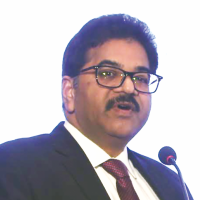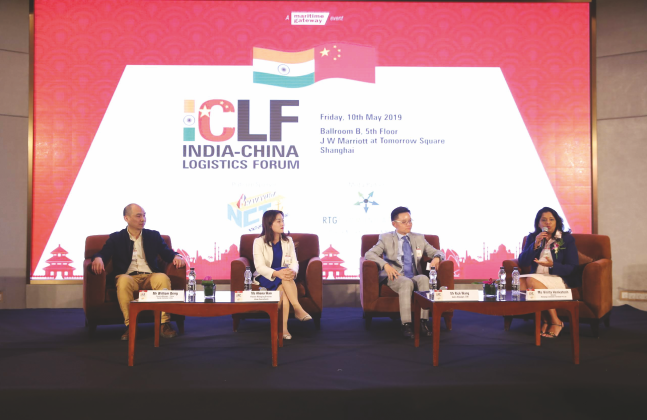The debut edition of India-China Logistics Forum focused on growing Indo-China trade and the logistics efficiency east coast ports can offer
 The debut edition of India China Logistics Forum organised in Shanghai saw an august gathering of trade and service providers. Presenting the welcome address, Ramprasad, Editor-in-Chief and Publisher, Maritime Gateway, invited the gathering to deliberate on ways to improve bilateral trade, identify ports to optimise cargo movement and collectively contribute to bring in more efficiency into the system. The first session of the daylong event focused on growing India- China trade and the role of east coast ports in offering time and cost efficient logistics.
The debut edition of India China Logistics Forum organised in Shanghai saw an august gathering of trade and service providers. Presenting the welcome address, Ramprasad, Editor-in-Chief and Publisher, Maritime Gateway, invited the gathering to deliberate on ways to improve bilateral trade, identify ports to optimise cargo movement and collectively contribute to bring in more efficiency into the system. The first session of the daylong event focused on growing India- China trade and the role of east coast ports in offering time and cost efficient logistics.
Stanley Tsang, MD, Ben Line Agencies: How Maersk line has taken the advantage in operating into the NCT Terminal for a couple of years now?
Julio Andres Diaz, Commercial Planning Manager, Maersk Line: Krishnapatnam Port has played a major role in the development of one of our major products – the Chennai Express that connects from North and South China to India. India is a complex market so the dynamics of people’s movement where our customers are placing their factories and how the logistics are developing in that country are something difficult to foresee for us. So we are trying to get closer to them by having a wider coverage. In this case, the east coast of India has helped us a lot. There are few industries that we have helped develop and they have also asked to grow our presence in India. Also there are few hinterland locations that we could earlier access through road or rail only, but by having a call on east India we have opened an alternative to the customers giving them the option to improve their transit time.
In terms of growth China is one of the key engines for Maersk and that’s why the shipping giant is present in all the major markets of the country. Maersk operates through 44 warehouses in China and recently a new warehouse is established in Nansha. Offering a cost-effective and fast option to customers is the intercontinental rail. In India, Maersk has 12 mainline services calling and operates 60 inland acceptance ports. It connects to Ennore, Chennai, Vizag and Krishnapatnam Ports. To reduce uncertainties Maersk allows its customers to book in advance at a fixed price to make sure cargo gets onboard the intended ship without fail.
Stanley Tsang: How are you conveying the advantage to the shippers in the hinterland?
Julio Andres Diaz: Every time we develop a new gateway or landside service, there is a strong focus to inform the shippers about it. Majority of the time we ask the shippers to focus on these services to save time and cost. It is difficult for someone sitting in Shanghai to know that apart from rail service from Nhava Sheva to Hyderabad there is also a road option from Krishnapatnam Port. We are focusing on creating awareness around that, but there is still a long time to go.
Stanley Tsang: How do you see the trade ties between China and India, especially relating to the chemical business?
Liu Feng, Deputy General Manager, Anhui Bayi Chemical: The past 20 years witnessed great changes in markets. In 1990s, we exported a lot to US, Europe and Japan, dozens of containers every month. We experienced the change in logistics, which became a trend for the industry. We ship to India dozens or even hundreds of containers every week. If we ship to other countries a few containers, that can be counted as a big business in that country. If a country is very rich with a small population, the business or transactions wouldn’t be big. So there are huge opportunities for china and India.
Stanley Tsang: What do you think is the biggest challenge for your business in India, regarding ocean shipping? What are you suggestions for the ports? What help you want to get from them to transport your cargo with lowest cost and fastest speed?
Liu Feng: We have done business with India for decades. We’ve seen its improvement. There are problems too. Chemicals is a heavily regulated business and requires professional handling. Ports may not be able to cope up with the requirements of chemicals. The challenge is, once you already have an established channel and you want to choose a new channel, you will be a bit concerned. It takes time for a business and a new set of logistics to get used to each other. We hope the people from Ports who will be in contact with us are more professional. I hope these people can study and be more familiar with different categories of chemicals or hazardous articles.
Stanley Tsang: What role can Freight Forwarding Association play in the China-India trade?
Ge Shangen, Deputy General Secretary, Shanghai Association of Freight Forwarding:
The association aims to establish a platform for resources sharing, get the resources to our members, so they can develop and thrive. China has a big market with many forwarders, so we need to organize it orderly. Maersk said it well, we, freight forwarders are a bridge connecting the shippers and ports regarding modern services. Therefore we organize those forwarders on this platform. Education, training and coaching related to Customs policies, operation guidelines of ports, standards of handling chemicals or dangerous goods should be provided by our association. Once cargo owners have conflicts with ship owners and forwarders, our association will step up and coordinate.
Stanley Tsang: For example, I have a forwarder in china and I want to know the information outside China, like India. I have a few customers who have questions about Indian logistics, like Indian inland transportation or ocean shipping routes. Can your association provide consulting service to such cargo owners?
Ge Shangen: Yes. We gather all forwarders on this platform. Different forwarders have their strengths, for example, Sinotrans covers a wide range of service, like bulk cargo, chemicals, railway and air transportation. But its service quality may not be very high. Ocean shipping agency can provide many opportunities to shippers. We as a forwarder have deep expertise about the freight operations in India and you as a forwarder have question about that part. The association can match these two forwarders and the one with expertise can share their experience. So the association is a great boost to the China-India trade.
Stanley Tsang: NCT has its strengths in local operations, like its connection with customs, warehouse services, and so on. Traditionally you may use Chennai as a port, but NCT has many resources, low cost and connections to inland, ocean and railway transportation. You mentioned forwarders in China. According to my observation, when they recommend and introduce a new logistic system among peers, they may not mention NCT with its low cost and strengths because they may have a vested interest. I think the association can get more information from NCT, so you can spread the strengths and benefits to your members if they go to the hinterland of India possibly through ICD.








